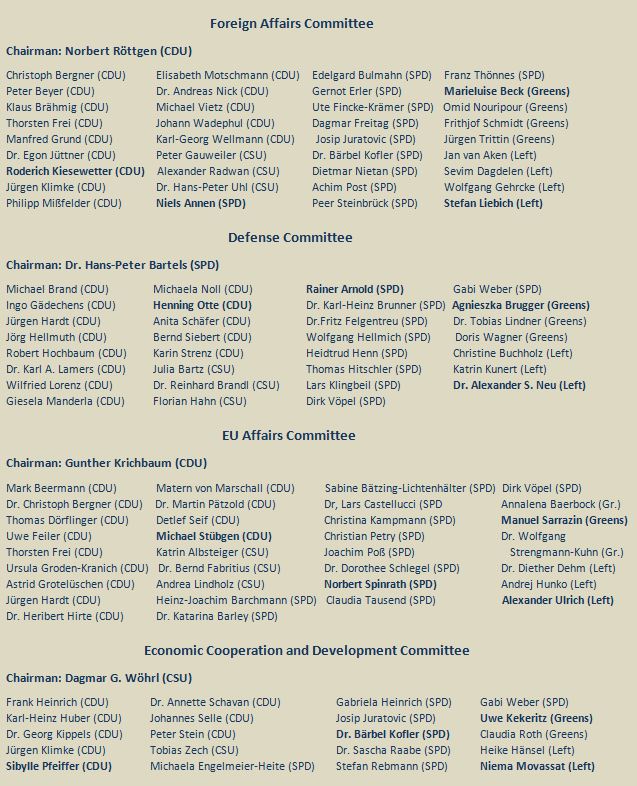Bundestag Committees
Stephan Wallace
Defense and Security Policy Analyst
Stephan Wallace is a defense and security policy analyst following political, military, and economic developments in Europe. He has worked more than 33 years on this area for the U.S. government, most recently for the U.S. Department of Defense.
The Bundestag plays a role in German foreign and defense policy through the oversight of government ministries, budget appropriations, and the requirement that it approve foreign military operations. The work of the Bundestag is conducted primarily through the permanent committees, which are reestablished at the beginning of each new parliament following federal elections. Three of the Bundestag committees dealing with foreign and defense policy—the committees for Foreign Affairs, Defense, and EU Affairs—are constitutionally mandated by the Basic Law. The Foreign Affairs and Defense Committees usually conduct their business in closed sessions because of the sensitive and often classified nature of the information they discuss.[1]
Members of the committees are selected by the respective parliamentary group leaders of the parties represented in the Bundestag. The parties are entitled to seats on the committees in proportion to their representation in the Bundestag. Committee chairs are determined in accordance with a formula agreed by the parliamentary groups that sets the order in which each group lays claim to a chairmanship. Each parliamentary group also names a senior representative to serve as its leader and primary spokesman on the committee. These senior representatives play a key role in negotiations to resolve differences or conflicts among committee members.[2]
Members of committees addressing foreign or defense issues in the Bundestag.
Committee chairs and leaders for the party groups on the committees are shown in bold type.
(Source: Deutscher Bundestag)
Committee Chairs
Norbert Röttgen (CDU) chairs the Bundestag Foreign Affairs Committee. Röttgen turned to foreign policy in mid-2012 in an effort to restart his political career after leading the CDU to a humiliating defeat in the 13 May 2012 state elections in North Rhine-Westphalia and subsequently losing his post as Environment Minister in the federal government.[3] In a recent interview with Deutschlandfunk, Röttgen supported moves toward greater German engagement in efforts to resolve international problems, including the willingness to use military force when necessary. He also insisted that greater European unity is necessary for European powers to remain influential in world affairs.[4]
Dr. Hans-Peter Bartels (SPD) chairs the Bundestag Defense Committee. The SPD deputy from Kiel has been a member of the committee since 2000 and is one of his party’s leading defense experts. He supports greater German military engagement in Africa, especially as part of a larger European security effort. Bartels is a strong supporter of greater EU military integration and lists “the step-by-step development of the EU’s European Security and Defense Policy in the direction of a European Army” as one of his biggest challenges for the next four years. In a recent interview with Germany’s Die Welt, he emphasized the need for the EU to have its own operational headquarters.[5]
Gunther Krichbaum (CDU) retains the Chairmanship of the Bundestag Committee for EU Affairs, which he has held since 2007. Krichbaum has been a member of the committee since 2002. The committee deals with fundamental questions of European integration, including institutional matters and EU enlargement. Krichbaum has sharply criticized UK Prime Minister David Cameron’s plans to hold a referendum on the future of Britain’s EU membership and warned London of the risk the referendum would become “less about the question asked and more about the person who’s asking it.”[6]
Dagmar Wöhrl (CSU) retains the chairmanship of the Bundestag Committee for Economic Cooperation and Development, which she has held since 2009. Wöhrl previously served as a Parliamentary State Secretary in the Economics Ministry from 2005 to 2009. She has focused her efforts on finance and budget issues, education projects, and anti-poverty programs, and also pushed for greater use of information technology in support of development programs. In a recent interview with Deutsche Welle, Wöhrl said the main focus of Germany’s development assistance will continue to be in sub-Saharan Africa and the southern and eastern
Mediterranean.[7]
Stephan Wallace is a defense and security policy analyst following political, military, and economic developments in Europe. He has worked more than 33 years on this area for the U.S. government, most recently for the U.S. Department of Defense. He can be contacted by email at wallace.stephan@gmail.com. The views expressed are those of the author alone. They do not necessarily reflect the views of the American-German Institute (AGI).
[1] “Funktion und Aufgabe der ständigen Ausschüsse,” Deutscher Bundestag; “Auswärtiger Ausschuss,” Deutscher Bundestag; “Verteidigungsausschuss,” Deutscher Bundestag.
[2] “Funktion und Aufgabe der ständigen Ausschüsse,” Deutscher Bundestag.
[3] Matthias Geis, “Er ist dann mal wieder da,” Die Zeit, 21 Nov 2013; “Neuer Job für Röttgen,” Süddeutscher Zeitung, 13 June 2012.
[4] Norbert Röttgen, “Wir brauchen eine Kultur des Engagements,” Deutschlandfunk (interview with Klaus Remme), 26 January 2014.
[5] Hans-Peter Bartels, “Mehr Selbstbewusstsein in Sicherheitsfragen,” Deutschlandradio Kultur (interview with Nana Brink), 26 February 2014; “Hans-Peter Bartels neuer Vorsitzender der Verteidigundsausschusses,” Hans-Peter Bartels SPD, January 2014; Hans-Peter Bartels , “Wir können in Afrika nicht nur Zuschauer sein,” Die Welt, 21 January 2014.
[6] Patrick Wintour, “Germany tells Cameron: don’t blackmail the EU,” Guardian (UK), 10 January 2013.
[7] Dagmar Wöhrl, “Internationale Zusammenarbeit statt Entwicklungszusammenarbeit,“ Deutsche Welle (interview with Mirjam Gehrke), 16 Jan 2014; Cordula Eubel, “Über ihre Welt,” Der Tagesspiegel, 11 February 2014.









